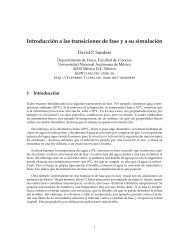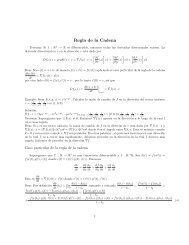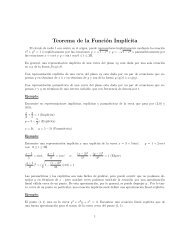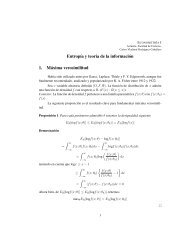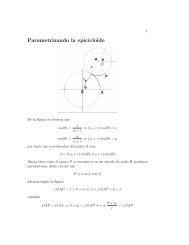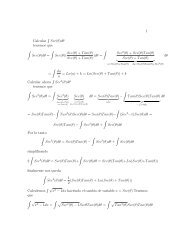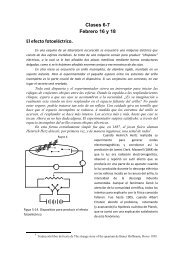"Surely You're Joking, Mr. Feynman!" - unam.
"Surely You're Joking, Mr. Feynman!" - unam.
"Surely You're Joking, Mr. Feynman!" - unam.
Create successful ePaper yourself
Turn your PDF publications into a flip-book with our unique Google optimized e-Paper software.
ight hand and the left hand, that there's a way to define the right hand by physical<br />
phenomena. I don't know that that's so terrible, though there must be some bad<br />
consequences of that, but I don't know. Why don't you ask the experts tomorrow?"<br />
He said, "No, they won't listen to me. You ask."<br />
So the next day, at the meeting, when we were discussing the tautheta puzzle,<br />
Oppenheimer said, "We need to hear some new, wilder ideas about this problem."<br />
So I got up and said, "I'm asking this question for Martin Block: What would be<br />
the consequences if the parity rule was wrong?"<br />
Murray GellMann often teased me about this, saying I didn't have the nerve to<br />
ask the question for myself. But that's not the reason. I thought it might very well be an<br />
important idea.<br />
Lee, of Lee and Yang, answered something complicated, and as usual I didn't<br />
understand very well. At the end of the meeting, Block asked me what he said, and I said<br />
I didn't know, but as far as I could tell, it was still open there was still a possibility. I<br />
didn't think it was likely, but I thought it was possible.<br />
Norm Ramsey asked me if I thought he should do an experiment looking for<br />
parity law violation, and I replied, "The best way to explain it is, I'll bet you only fifty to<br />
one you don't find anything."<br />
He said, "That's good enough for me." But he never did the experiment.<br />
Anyway, the discovery of parity law violation was made, experimentally, by Wu,<br />
and this opened up a whole bunch of new possibilities for beta decay theory. It also<br />
unleashed a whole host of experiments immediately after that. Some showed electrons<br />
coming out of the nuclei spun to the left, and some to the right, and there were all kinds<br />
of experiments, all kinds of interesting discoveries about parity. But the data were so<br />
confusing that nobody could put things together.<br />
At one point there was a meeting in Rochester the yearly Rochester Conference.<br />
I was still always behind, and Lee was giving his paper on the violation of parity. He and<br />
Yang had come to the conclusion that parity was violated, and now he was giving the<br />
theory for it.<br />
During the conference I was staying with my sister in Syracuse. I brought the<br />
paper home and said to her, "I can't understand these things that Lee and Yang are saying.<br />
It's all so complicated."<br />
"No," she' said, "what you mean is not that you can't understand it, but that you<br />
didn't invent it. You didn't figure it out your own way, from hearing the clue. What you<br />
should do is imagine you're a student again, and take this paper upstairs, read every line<br />
of it, and check the equations. Then you'll understand it very easily."<br />
I took her advice, and checked through the whole thing, and found it to be very<br />
obvious and simple. I had been afraid to read it, thinking it was too difficult.<br />
It reminded me of something I had done a long time ago with left and right<br />
unsymmetrical equations. Now it became kind of clear, when I looked at Lee's formulas,<br />
that the solution to it all was much simpler: Everything comes out coupled to the left. For<br />
the electron and the muon, my predictions were the same as Lee's, except I changed some<br />
signs around. I didn't realize it at the time, but Lee had taken only the simplest example<br />
of muon coupling, and hadn't proved that all muons would be full to the right, whereas<br />
according to my theory, all muons would have to be full automatically. Therefore, I had,



